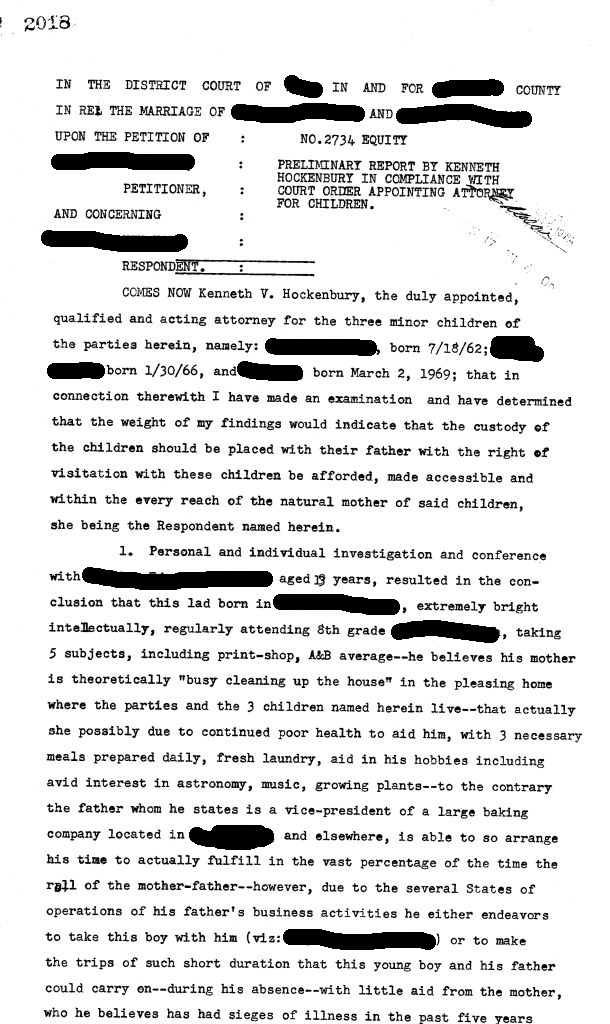My dad and I were a lot alike. I believe we thought in much the same way about many things.
I recently looked up the results of an old Meyers-Briggs test — possibly the first one I ever took, at my first job. I was typed as an ESFJ.
Reading the description I found here made me think about whether Dad might not have been an ESFJ, too. I’ll never know, of course, but it is kind of comforting to me to think so.
The bold remarks below are from the original; my observations are in italics.
Male ESFJs
As a type, ESFJs probably personify “motherhood”. Their gentle, caring nature, in its Extraverted way, takes them beyond their own needs to serve the world around them. As a result, they are the hosts and hostesses of the world. ESFJ males, who have less need to be “in charge” than to be concerned with others’ needs, may be torn between expressing the more conventionally masculine parts of their personalities and giving in to opposing tendencies. The male’s Sensing-Judging temperament, sometimes described as “stabilizer-traditionalist”, demands macho, objectively cool, yet aggressive behavior, while the Extraverted-Feeling preferences demands a warm or more caring and gentler role.
Certainly my father took on a traditionally female role when he took custody of his three youngest children. If you read the testimony I gave our lawyer, it is clear that Dad’s idea of taking care of someone included service and concern with others’ needs.
This also makes sense if you ask why on earth this man would have chosen to — fought to! — take on the role of parenting three small children, one of them a 6YO girl, in an era when it was far more expected that he would cut and run. (My siblings have various other explanations, from “he did it to hurt Mom” to “he fought for custody of the kids because whoever got the kids got the house.” Yeah, right. The house he sold in the fall of 1989, when I was in college, on my first co-op, and it became clear that I would never come to live at home again. But maybe this acknowledges, in a twisted kind of way, that the HOME was important to him, as discussed below.)
This could also give a clue as to why my parents even got married — if Mom liked to be taken care of, and Dad did indeed take care of her — until there were children, at which point her job became to take care of them — well. I just bet she’d resent that change in the arrangement. And maybe for good reason, sort of. “All conflict is caused by differing expectations” and if Mom somehow expected not to have to get her hands dirty once she had a house and kids to take care of, while Dad clearly expected exactly that — it’s a recipe for disaster. It’s a mystery to me where she would have gotten that expectation, though. Who thinks running a house by yourself all week and taking care of kids is an easy job? She came from a big family of mostly girls, so maybe the older ones did most of the work? I’ll never know.
Female ESFJs
If the ESFJ male is something of a fish out of water, the ESFJ female, in contrast, often represents the epitome of femininity. She always wears the right clothes, says the right words, and behaves the right way. ESFJ girls are the perfect children who never get dirty, and even as adults, never seem to get mussed. There’s something about an ESFJ — especially the female — that just reeks of appropriateness in all aspects of life.
I’m not too sure about this for myself, but I do know I have always been neat and tidy, even as a child.
Weak points
Don’t think that ESFJs have found perfection, however. As EJs, for example, they are given to quick, abrasive comments whenever their routines are interrupted. As SFs, however, they are critical of their own EJ behavior and compensate for their abrasiveness with extra sweetness. To paraphrase Isabel Briggs Myers, they have many “shoulds” and “should nots”, and they express them freely. They may especially overlook facts when they find a situation disagreeable or a criticism hurtful. As a result, they may sweep problems under the rug rather than seek solutions.
Dad hated it when dinner was late. And I can remember there were certain things that happened every week, such as me cleaning out the refrigerator.
Routines weren’t always about chores, though. The last summer I spent at home, we cooked a T-bone steak out on a little hibachi grill on the back steps every Sunday evening.
And perhaps this helps explain why my dad continued to work at a job that made him an absentee father for years, even as the marriage apparently deteriorated.
Home life
 The ESFJ’s home is the center of his or her universe: it is the focus of family life, the place for entertainment, the bastion against the harshness of the outside world, the ultimate womb for all family members. The ESFJ’s home is generally neat and orderly, however much activity takes place there. It isn’t advisable to tell an ESFJ to relax as long as there are unmade beds or messy kitchens. Relaxation for the ESFJ comes both from doing such chores and from knowing that they are done. (As an EJ, they may complain about the mess and about how much work must be done, but they nevertheless are happiest in serving others in this way.) Like all Js, ESFJs schedule their relaxation whether it be reading a book or being with friends.
The ESFJ’s home is the center of his or her universe: it is the focus of family life, the place for entertainment, the bastion against the harshness of the outside world, the ultimate womb for all family members. The ESFJ’s home is generally neat and orderly, however much activity takes place there. It isn’t advisable to tell an ESFJ to relax as long as there are unmade beds or messy kitchens. Relaxation for the ESFJ comes both from doing such chores and from knowing that they are done. (As an EJ, they may complain about the mess and about how much work must be done, but they nevertheless are happiest in serving others in this way.) Like all Js, ESFJs schedule their relaxation whether it be reading a book or being with friends.
As a rule, home can be a place of fun, happiness, and affirmation for the ESFJ. These things must take place on schedule, however, and in an “appropriate” manner. Parties, for example, are great, but only when sufficiently planned; “spontaneous fun” is a contradiction in terms. “Appropriateness” extends to dress, decor, and behavior. ESFJs mete out assignments to family members and expect them to be done correctly and in timely fashion. They readily impose behavioral “shoulds” on other family members, and when disappointed in their expectations of others they become either hurt or upset.
In my younger adult days, I always had a difficult time leaving chores undone. Over the two decades I have spent running my own home with my husband, I have learned to relax on this a bit. But I still have a hard time, say, walking the dog after dinner before all the dishes are cleared away and the kitchen is spic and span. I hate to come home to dirty dishes on the counter, whether we have been gone 5 minutes or two weeks. When we travel, the house has to be neat and everything in its place before we leave.
This phrase is me all over: “Parties, for example, are great, but only when sufficiently planned” — and “spontaneous fun is a contradiction in terms” could be tattooed on my forehead.
If Dad thought this way too, then when he came home from a long work week to find the home in disarray, it is not hard to imagine that he would find this a betrayal of how things were supposed to be.
Parenting
This need for appropriateness also drives ESFJs’ parenting style. The child of an ESFJ parent probably feels loved and generally satisfied, albeit somewhat restricted by the “shoulds” and “oughts”, coupled with the constant need to put work (homework, housework, etc.) before play. ESFJs are generally very patient with children, although even patience can be subject to other demands and responsibilities. An ESFJ parent is likely to be looked upon as being somewhat strict, but still very loving and caring.
My older siblings have complained about how they never could have any fun on the weekends, when Dad was home, and of course this got blamed on Dad’s presence and his insistence on doing chores first before fun — chores that apparently didn’t get done while he was gone all week. What gets left out is that if Mom had disciplined herself, and them, to do the chores during the week, there would have been opportunity to have fun on the weekend.
Relationships
The same, in fact, may be said of ESFJs in relationships. They are very loyal, almost to a fault, often sacrificing their own needs in favor of the mates’. This, combined with with their drive for harmony, often puts their personal welfare low on the list of priorities and can result in their feeling more like hired help than lovers or mates. The paradox is that while it is difficult for them to acknowledge their own needs, they may resent those who take them for granted.
Growing up
ESFJ children bring the same graciousness, caring, and punctuality to their young lives. They tend to be neat and easy to be around. At school, ESFJs like teachers who stick to a lesson plan and generally “follow the rules”. They respond well in such situations with good work habits and punctually completed assignments. In one study, ESFJs were rated by teachers and school psychologists as the ideal type to have in the classroom. Many of the qualities desired by teachers come naturally to ESFJs: they are helpful, cooperative, and eager to please.
They are like that at home too. But difficulties may arise with ESFJs, as with all Js, if some of the demands placed on them conflict with strong inner needs. Bedtime, for example, can be difficult for the gregarious Extraverted child, whose social needs may conflict with the night’s hour and parents’ demands. Still, ESFJ children think “parents should be parents” and appreciate rules and regulations imposed by those in authority. Like their SJ adult counterparts, they may protest such authority, at the same time respecting and expecting it. Role clarity is important.
Hell, I still have a hard time going to bed at a decent hour.
Careers
ESFJs’ careers often lean toward those that serve humanity: nursing, public school teaching, clergy, and psychology. Sales and other public service-oriented jobs also have particular appeal. More impersonal tasks (related to computers, for example, or bookkeeping) and jobs that demand theory and speculation (such as college teaching, consulting, and especially investment brokering) can be particularly stressful to an ESFJ.
I have thought for a long time that I should have gone into psychology. I am only partly joking when I quip that what I do now — teaching knitting — is about 1/3 therapy.
Late in life
In their later years, ESFJs may mellow somewhat, but they still are guided by the same values that shaped their earlier years. After a life devoted to meeting the needs of those around them, they may turn their attention to more abstract, universal concerns. Even in retirement, however, they tend to be driven by “shoulds” (and, perhaps, a few “shouldn’ts”), though the “shoulds” may be of a more leisurely kind, with perhaps less emphasis on service ideals — for example, learning a language, tending to neglected hobbies, or meeting some self-directed needs. In general, home, children, and grandchildren play central roles; they prefer to have family nearby and accessible, and may also enjoy the occasional unexpected visitor. For them, the ultimate symbol of security may be the continually replenished woodpile for the fireplace around which the family gathers.










